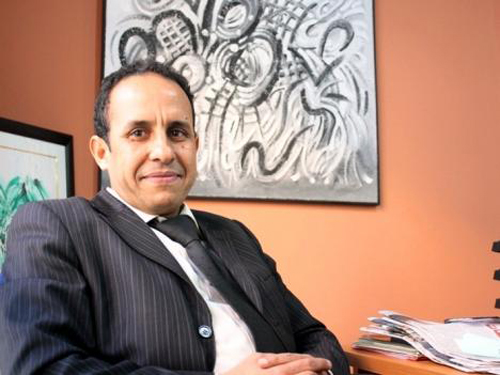Jailing of Journalist Exposes Shortcomings of Reform in Morocco
by openDemocracy / Hassan Masiky / October 26, 2013 / No comments

Moroccan editor Ali Anouzla was arrested September 17, 2013. Photo via IFEX
The Al Qaeda in the Islamic Maghreb (AQIM) recent video calling for jihad in Morocco is incendiary, violent and offensive. It is Al Qaeda propaganda, and as such its diffusion and reproduction is unwise and dangerous. Yet, a decision by the Moroccan website Lakome.com to post a link to this AQIM video does not amount to a crime but rather to a lapse in judgment that calls for a warning and/or fine but not the jailing of the site’s editor.
The Moroccan government’s resolution to arrest Mr. Ali Anouzla, the editor of the Arabic version of Lakome.com, and its threats to prosecute the Spanish daily El Pais for posting a link to the video, are rash decisions that have given AQIM more air-time and exposure than the 44 minutes registration in question could ever have achieved.
While the video is an incitement to terrorism and hatred, Mr. Anouzla who wrote several editorials calling for “secular” changes in Morocco, is hardly an AQIM apologetic. For Moroccan and international observers, the arrest and confinement of Ali Anouzla on the charges of “providing material support to terror groups” is politically motivated.
A quick scan of the jailed editor columns reveals the anti-establishment nature of his writings and his penchant for pushing the boundaries of freedom of press in Morocco. As Amnesty International says, “[Anouzla] is a prisoner of conscience and should be released immediately and unconditionally.” Since his arrest, Lakome.com has been re-publishing his articles to expose the political nature of the case.
Moroccan officials have not learned from their past mistakes. Time and time again the government attempts to muzzle outspoken critics using the judiciary, a measure which usually backfires, leaving the regime open to international criticism and further punishing the image of the Kingdom. The arrest of Anouzla is the latest chapter in a series of harassment cases against uncompromising journalists. Such instances reinforce the impression that media freedom is under attack in the country.
Rabat should revisit the cases of past outspoken writers who were either chased out of the country or silenced by the judicial system. Moroccan officials should consider the long term implications of such incidents on the reputation of the country as hostile to the freedom of speech. Might it not be the case that Anouzla too might eventually join the group of journalists who initially started as local celebrities conducting investigative reporting into corruption and political nepotism in Morocco, then turned into die-hard opponents of the regime?
The Moroccan authorities’ harassment and provocation of dissident voices have politically hardened several journalists who are currently in “self-imposed exile”. Today, writings by this group are the most vocal and widely read accounts of the Moroccan political scene, making the decision to force critics to move overseas or go “underground” thouroughly counterproductive.
If the goal of Moroccan officials is to silence Anouzla, their attempts have been fruitless thus far, as more and more activists and international organizations adopt his case and propagate the same articles Moroccans are trying to suppress. In fact, Anouzla moved from a local bold journalist unknown outside Morocco to an international cause célèbre thanks to Rabat’s ill-advised decision to arrest him.
Popular outrage went beyond the condemnation of the ‘security apparatus’. Moroccan human rights activists harshly criticize the Islamist government of Prime Minster Benkirane (PJD) and its handling of the case. The public was especially furious with the Minister of Communications Mr. Mustapha El Khalfi – who not long ago was himself writing for a web-based news outlet like Lakome.com – for using vague and incoherent justifications to excuse the arrest of Anouzla and for defending restrictions on freedom of expression. During a recent conference at a Moroccan university, El Khalfi was booed by the crowd chanting for the release of the jailed journalist, forcing the Minister to leave the event.
If Anouzla’s case has generated sympathy worldwide, some Moroccan observers have espoused the official argument denouncing Anouzla’s decision to publicize an “AQIM dispatch”. Several Moroccan citizens took to popular websites, decrying the video in which the narrator blasts the King’s pro-western policies and deplores the living conditions of the Moroccan people while calling young Muslims to join the fight against non-believers.
Despite the domestic and international support he enjoyed, the Lakome.com editor remains a controversial figure in his country. Moroccan nationalists have accused him in the past of sympathizing with the Algeria-based Polisario Front. Anouzla, son to a Sahrawi family, was criticized for visiting the camps run by the Saharan separatists in Tindouf, Algeria. His stand on the western Sahara conflict remains divisive.
Nonetheless the French and Arabic versions of Lakome.com have been drawing much more traffic than ever. It is safe to say that Mr. Anouzla and his website have become very well-known since his arrest. For the critics, this move is a sign that Morocco is not serious about reforms and that recent political transformation are mere lip service.
The Moroccan establishment again underestimates international criticism regarding what officials consider as local matters. The Anouzla case will continue to have serious ramifications on Morocco’s foreign policy as more and more publicity is given to the event. The only way out of this trap is to release Anouzla and to handle the incident of the AQIM video in court according to national and international media laws. Ali Anouzla is guilty of bad judgment not of terrorism.
The fact that Moroccan officials “tolerated” the writings of Anouzla and his like previously endowed Moroccco with the image of a “democratic and open” country. Conversely, the jailing of a critical voice shows the Kingdom to be unjust, overbearing and hesitant. The arrest of Mr. Ali Anouzla is a bad decision that needs to be rectified soon.
This article was orginally published by openDemocracy on October 11, 2013




